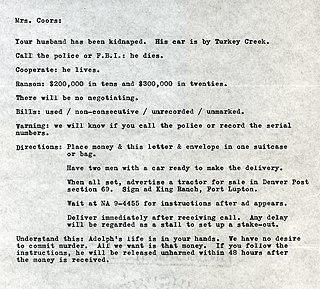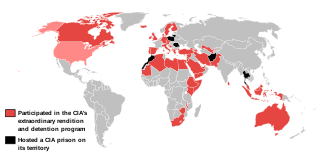Related Research Articles
Maher Arar is a telecommunications engineer with dual Syrian and Canadian citizenship who has resided in Canada since 1987.
Extrajudicial punishment is a punishment for an alleged crime or offense which is carried out without legal process or supervision by a court or tribunal through a legal proceeding.

Human rights in Uzbekistan have been described as "abysmal" by Human Rights Watch, and the country has received heavy criticism from the UK and the US for alleged arbitrary arrests, religious persecution and torture employed by the government on a regional and national level. Amnesty International stated that freedom of expression, association, and peaceful assembly continue to be restricted, and that relations between gay men are illegal.

Abu Ghraib prison was a prison complex in Abu Ghraib, Iraq, located 32 kilometers (20 mi) west of Baghdad. Abu Ghraib prison was opened in the 1950s and served as a maximum-security prison with torture, weekly executions, and poor living conditions. From the 1970s, the prison was used by Saddam Hussein and later the United States to hold political prisoners. It developed a reputation for torture and extrajudicial killing, and was closed in 2014.

During the early stages of the Iraq War, members of the United States Army and the CIA committed a series of human rights violations and war crimes against detainees in the Abu Ghraib prison in Iraq, including physical and sexual abuse, torture, rape and the killing of Manadel al-Jamadi. The abuses came to public attention with the publication of photographs of the abuse by CBS News in April 2004. The incidents caused shock and outrage, receiving widespread condemnation within the United States and internationally.
Criticism of the war on terror addresses the morals, ethics, efficiency, economics, as well as other issues surrounding the war on terror. It also touches upon criticism against the phrase itself, which was branded as a misnomer. The notion of a "war" against "terrorism" has proven highly contentious, with critics charging that participating governments exploited it to pursue long-standing policy/military objectives, reduce civil liberties, and infringe upon human rights. It is argued by critics that the term war is not appropriate in this context, since there is no identifiable enemy and that it is unlikely international terrorism can be brought to an end by military means.

Extraordinary rendition is a euphemism for state-sponsored forcible abduction in another jurisdiction and transfer to a third state. The phrase usually refers to a United States-led program used during the War on Terror, which had the purpose of circumventing the source country's laws on interrogation, detention, extradition and/or torture. Extraordinary rendition is a type of extraterritorial abduction, but not all extraterritorial abductions include transfer to a third country.
Torture, the infliction of severe physical or psychological pain upon an individual to extract information or a confession, or as an illicit extrajudicial punishment, is prohibited by international law and is illegal in most countries. However, it is still used by many governments. The subject of this article is the use of torture since the adoption of the 1948 Universal Declaration of Human Rights (UDHR), which prohibited it.

Mamdouh Habib is an Egyptian and Australian citizen with dual nationality, best known for having been held for more than three years by the United States as an enemy combatant, by both the Central Intelligence Agency (CIA) and military authorities. He was sent by extraordinary rendition from Pakistan to Egypt after his arrest. He was held the longest at the Guantanamo Bay detention camp as an enemy combatant. Finally released without charges in January 2005, Habib struggled to have his account of his experiences believed, as he alleged he had been tortured by the CIA, Egyptians, and US military, at times with Australian intelligence officers present. For some time, each of the governments denied his allegations, but they have gradually been confirmed.
Ghost detainee is a term used in the executive branch of the United States government to designate a person held in a detention center, whose identity has been hidden by keeping them unregistered and therefore anonymous. Such uses arose as the Bush administration initiated the War on Terror following the 9/11 attacks of 2001 in the United States. As documented in the 2004 Taguba Report, it was used in the same manner by United States officials and contractors of the Joint Interrogation and Debriefing Center at the Abu Ghraib prison in Iraq in 2003–2004.

Binyam Ahmed Mohamed, also referred to as Benjamin Mohammed, Benyam Mohammed or Benyam Mohammed al-Habashi, is an Ethiopian national and United Kingdom resident, who was detained as a suspected enemy combatant by the US Government in Guantanamo Bay prison between 2004 and 2009 without charges. He was arrested in Pakistan and transported first to Morocco under the US's extraordinary rendition program, where he claimed to have been interrogated under torture.
Extrajudicial prisoners of the United States, in the context of the early twenty-first century War on Terrorism, refers to foreign nationals the United States detains outside of the legal process required within United States legal jurisdiction. In this context, the U.S. government is maintaining torture centers, called black sites, operated by both known and secret intelligence agencies. Such black sites were later confirmed by reports from journalists, investigations, and from men who had been imprisoned and tortured there, and later released after being tortured until the CIA was comfortable they had done nothing wrong, and had nothing to hide.
Khaled El-Masri is a German and Lebanese citizen who was mistakenly abducted by the Macedonian police in 2003, and handed over to the U.S. Central Intelligence Agency (CIA). While in CIA custody, he was flown to Afghanistan, where he was held at a black site and routinely interrogated, beaten, strip-searched, sodomized, and subjected to other cruel forms of inhumane and degrading treatment and torture. After El-Masri held hunger strikes, and was detained for four months in the "Salt Pit", the CIA finally admitted his arrest was a mistake and released him. He is believed to be among an estimated 3,000 detainees, including several key leaders of al Qaeda, whom the CIA captured from 2001 to 2005, in its campaign to dismantle terrorist networks.

Hassan Muhammad Salih bin Attash is a citizen of Saudi Arabia, held by the United States in the Guantanamo Bay detention camp in Cuba. Joint Task Force Guantanamo counter-terrorism analysts estimate that bin Attash was born in 1985, in Jeddah, Saudi Arabia.
The Guantanamo Bay detention camp is a United States military prison located within Guantanamo Bay Naval Base, also referred to as Guantánamo, GTMO, and Gitmo, on the coast of Guantánamo Bay in Cuba. Of the roughly 780 people detained there since January 2002 when the military prison first opened after the September 11 attacks, 735 have been transferred elsewhere, 35 remain there, and 9 have died while in custody.
Torture in the United States includes documented and alleged cases of torture both inside and outside the United States by members of the government, the military, law enforcement agencies, intelligence agencies, health care services, and other public organizations.
"Enhanced interrogation techniques" or "enhanced interrogation" is a euphemism for the program of systematic torture of detainees by the Central Intelligence Agency (CIA), the Defense Intelligence Agency (DIA) and various components of the U.S. Armed Forces at remote sites around the world, including Bagram, Guantanamo Bay, Abu Ghraib, and Bucharest authorized by officials of the George W. Bush administration. Methods used included beating, binding in contorted stress positions, hooding, subjection to deafening noise, sleep disruption, sleep deprivation to the point of hallucination, deprivation of food, drink, and medical care for wounds, as well as waterboarding, walling, sexual humiliation, subjection to extreme heat or extreme cold, and confinement in small coffin-like boxes. A Guantanamo inmate's drawings of some of these tortures, to which he himself was subjected, were published in The New York Times. Some of these techniques fall under the category known as "white torture". Several detainees endured medically unnecessary "rectal rehydration", "rectal fluid resuscitation", and "rectal feeding". In addition to brutalizing detainees, there were threats to their families such as threats to harm children, and threats to sexually abuse or to cut the throat of detainees' mothers.
Human rights in the United States comprise a series of rights which are legally protected by the Constitution of the United States, state constitutions, treaty and customary international law, legislation enacted by Congress and state legislatures, and state referendums and citizen's initiatives. The Federal Government has, through a ratified constitution, guaranteed unalienable rights to its citizens and non-citizens. These rights have evolved over time through constitutional amendments, legislation, and judicial precedent. Along with the rights themselves, the portion of the population granted these rights has expanded over time. Within the United States, federal courts have jurisdiction over international human rights laws.

CIA black sites refer to the black sites that are controlled by the CIA and used by the U.S. government in its War on Terror to detain enemy combatants.
References
- 1 2 U.S. Torture-by-proxy
- Jane Mayer (14 February 2005). "Outsourcing torture". The New Yorker . Retrieved 26 October 2014.
- Cobain, Ian; Grey, Stephen (2 August 2005). "British detainee's tale of US 'torture by proxy'". The Guardian. Retrieved 15 June 2015.
- ↑ "Torture by Proxy". Los Angeles Times . 11 March 2005. Retrieved 16 June 2015.
- ↑ Keating, Joshua (16 June 2015). "Senate votes to ban torture: Will It Stick This Time?". Slate.com. Retrieved 16 June 2015.
- ↑ Grey, Stephen (17 October 2006). Ghost Plane: The True Story of the CIA Torture Program. St. Martin's Press. pp. 11–. ISBN 978-1-4299-1957-9.